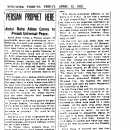Main menu
- ‘Abdu’l-Bahá’s Journey
- World Peace
- Stopping Racism in America
- Empowerment of Women
- More Principles...
- Prayer for America
Persian Prophet Here
‘Abdu’l-Bahá Abbas Comes to Preach Universal Peace.
‘Abdu’l-Bahá Abbas, a Persian prophet of world-wide peace and brotherliness, whose followers, it is said, now number 20,000,000, arrived here yesterday aboard the White Star liner Cedric on his first visit to America. Already he has a goodly following in the United States, being met at the pier by forty prosperous looking men and women, including Mountford Mills and Arthur Pillsbury Dodge, lawyers, and Mrs. W.H. Beede, of No. 412 West 115th street. It was Mrs. Beede, who predicted that the arrival of the “Servant of God” would become notable as “one of the greatest days in all history.”
The prophet of the Bahá’ís will be seventy-eight years old on May 23. He wears a long iron gray beard, a white turban from which his gray hair descends to his shoulders and flowing Eastern garments which make him look taller than he really is. With him travelled his nephew, Dr. Ameen Darred, and two other disciples, Said Assadullah and Effendi Shoghi.
“I am here,” ‘Abdu’l-Bahá said in his gentle foreign English, “to unify the religions of the world, to talk in the interests of universal peace. I have no creed to preach, no doctrines to propound. My word is the word of love.”
And as a part of his programme for universal peace and good will he favors a universal language and woman suffrage, saying on the latter subject:
“In Persia, where women’s faces are never seen save by their nearest relatives, the women played a heroic part in the early days of the Bahá’í movement, urging the husbands and sons on to martyrdom and paying the same penalty. The modern suffragette is fighting for what must be, and many of them are willing martyrs to imprisonment for their cause. One might not approve the ways of some of the more militant suffragettes, but in the end all this will adjust itself. If women obtained the same advantages as men, their capacity being the same, the result would be the same.
“The future generation depends on the mothers of today. Is not this a position of vital responsibility? Surely, God does not wish such an important instrument as woman to be less perfect than she is able to become. Divine justice demands that men and women should have equal rights. There is no difference between them. Neither sex is superior to the other in the sight of God.”
On the very day that ‘Abdu’l-Bahá was born in the city of Teheran, Ali Mahomet began his notable career in another part of Persia as the reformer of Islam, calling himself the “Báb,” or gateway of knowledge, and proclaiming the coming of a “messenger of God,” who would follow after him. Among the early followers of the Báb, who suffered cruel persecution at the hands of the Mahometan authorities, was Mirza Hossein Ali of Nour, a noble man, whom the Báb named Bahá’u’lláh, “The Glory of God.” This was the father of ‘Abdu’l-Bahá. Bahá’u’lláh, after the Báb’s death, announced himself as the Promised One. He founded the Bahá’í movement, and upon his death bequeathed the leadership to his son.
In 1868 Bahá’u’lláh and his followers, including his family, were banished to the prison city of Akka, in Syria, where the family remained confined until the Young Turks came into power, when the political prisoners in Akka were freed by a cable message. At the same time ‘Abdu’l-Bahá regained some of the wealth which had been taken from his father. He and his family removed to Alexandria, Egypt, in 1910, and it is from Alexandria that the prophet comes to New York. Except for brief visits to London and Paris last year, this is his first excursion into the Western World.
‘Abdu’l-Bahá is married and has four daughters, three of whom are married. His teachings counsel monogamy and favor the marriage of all. In the absence of sons, the leadership which he now exercises will at his death be vested in boards elected by the believers.









